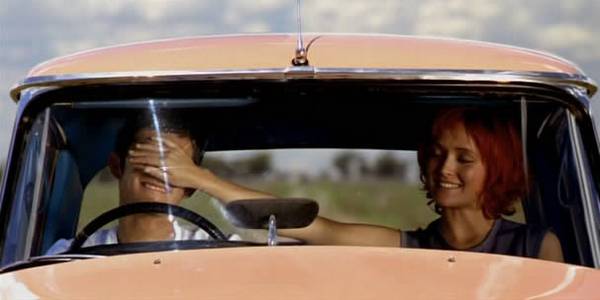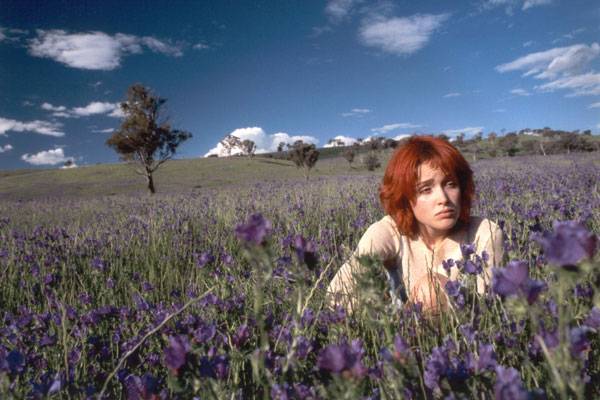 |
Statistics :
11630 Movies
19215 People
1448 Studios
29 Articles
73 Interviews
12 DVD Reviews
32452 Screenshots
3722 Videos
|
|
 |
 |
Themes of Existence and Dream |
2/3 - Page 6 |
 |
 |
 |
 |
 |
|

|
 Eddie Fong: I think this is the beginning of a new phase of our creative life. After 2001, after the making of the film, Goddess of 1967, we were so unsatisfied with what we had been doing. I mean, creatively. Eddie Fong: I think this is the beginning of a new phase of our creative life. After 2001, after the making of the film, Goddess of 1967, we were so unsatisfied with what we had been doing. I mean, creatively.

Rikiya Kurokawa and Rose Byrne in Goddess of 1967
|
| |
 Clara Law:
I think we were dissatisfied because we think that the process we used to work, our creativity before, was limiting us. We wanted to be free. We wanted to find more possibilities. Clara Law:
I think we were dissatisfied because we think that the process we used to work, our creativity before, was limiting us. We wanted to be free. We wanted to find more possibilities.
|
| |
 Eddie Fong:
The way we used to work is, for example, in Goddess, Clara would say, "I want to explore the dark side of human beings." From then onward, we started to brainstorm about the stories, the characters, and the lines. How can we express ourselves effectively, or what more can we do concerning this theme? We were going back and forth throughout the writing process. We tried to analyze almost everything. After Goddess, we asked ourselves whether this is the best we can do. At that time, we found two really good mentors. One is a painter working in Paris, and another one is a philosophy lecturer in Hong Kong. For almost twenty years, we have been good friends, and we have been influenced by these two people. When we try to find a new way to create our films, we fall back on the way our painter friend has been working. Actually, what he is trying to do is to develop a new aesthetic of painting. What he is trying to say is, "Go back to the essence of art. What is this all about?" From his point of view, we can see how he works with paintings, though we are working in a different medium. It’s film. What we’ve learned is that we should throw away everything that we’ve learned. We just have to throw away all the techniques, all the skills, all the ideas, almost everything, and, then, just let our intuition lead us into the film. Eddie Fong:
The way we used to work is, for example, in Goddess, Clara would say, "I want to explore the dark side of human beings." From then onward, we started to brainstorm about the stories, the characters, and the lines. How can we express ourselves effectively, or what more can we do concerning this theme? We were going back and forth throughout the writing process. We tried to analyze almost everything. After Goddess, we asked ourselves whether this is the best we can do. At that time, we found two really good mentors. One is a painter working in Paris, and another one is a philosophy lecturer in Hong Kong. For almost twenty years, we have been good friends, and we have been influenced by these two people. When we try to find a new way to create our films, we fall back on the way our painter friend has been working. Actually, what he is trying to do is to develop a new aesthetic of painting. What he is trying to say is, "Go back to the essence of art. What is this all about?" From his point of view, we can see how he works with paintings, though we are working in a different medium. It’s film. What we’ve learned is that we should throw away everything that we’ve learned. We just have to throw away all the techniques, all the skills, all the ideas, almost everything, and, then, just let our intuition lead us into the film. |
| |
 Clara Law: In a way, we moved away from our comfort zone. We’ve tried something experimental and totally new. What we felt at that time was that we had come to the point that we are confident, even if we don’t put in there what we really want to say. It’s actually in us. The way we look at the world, our philosophy in life, what we think, what we feel, what we worry about. Anything that has gone through us will come out even without us trying to say what we really want to say. In a way, we say this is intuition, but intuition that probably includes the whole of us. What we actually feel is that this is a more holistic approach, that we are not compartmentalizing ourselves. It’s more complex, and there is more possibility, and there is more freedom. It’d lead us to something that is limitless. There is no boundary anymore. Anything can happen in whatever we want to say or in whatever stories that we want to create. Actually, it doesn’t matter, because what we think, what we experience and what we want to say will be in it. Instead of trying too hard to say something, we actually hold back. We’re going the other way to hold ourselves back. What we want is to exist in the character itself. We’ll come up with something or somebody that will lead us, and, because we try to exist with him, we come into our working room like a blank piece of paper. We come in with a fresh mind, and we look at what we have done before and exist in "now" with him. This subject or object would become one with us. We feel more possibilities. I don’t really know how to describe it, but this is what we feel to be the right direction. Clara Law: In a way, we moved away from our comfort zone. We’ve tried something experimental and totally new. What we felt at that time was that we had come to the point that we are confident, even if we don’t put in there what we really want to say. It’s actually in us. The way we look at the world, our philosophy in life, what we think, what we feel, what we worry about. Anything that has gone through us will come out even without us trying to say what we really want to say. In a way, we say this is intuition, but intuition that probably includes the whole of us. What we actually feel is that this is a more holistic approach, that we are not compartmentalizing ourselves. It’s more complex, and there is more possibility, and there is more freedom. It’d lead us to something that is limitless. There is no boundary anymore. Anything can happen in whatever we want to say or in whatever stories that we want to create. Actually, it doesn’t matter, because what we think, what we experience and what we want to say will be in it. Instead of trying too hard to say something, we actually hold back. We’re going the other way to hold ourselves back. What we want is to exist in the character itself. We’ll come up with something or somebody that will lead us, and, because we try to exist with him, we come into our working room like a blank piece of paper. We come in with a fresh mind, and we look at what we have done before and exist in "now" with him. This subject or object would become one with us. We feel more possibilities. I don’t really know how to describe it, but this is what we feel to be the right direction.

Rose Byrne in Goddess of 1967
|
|
|
| |
 |
|
|
Page :
1
2
3
4
5
6
7
Top
|
|
|
|
|
|
|
 |
